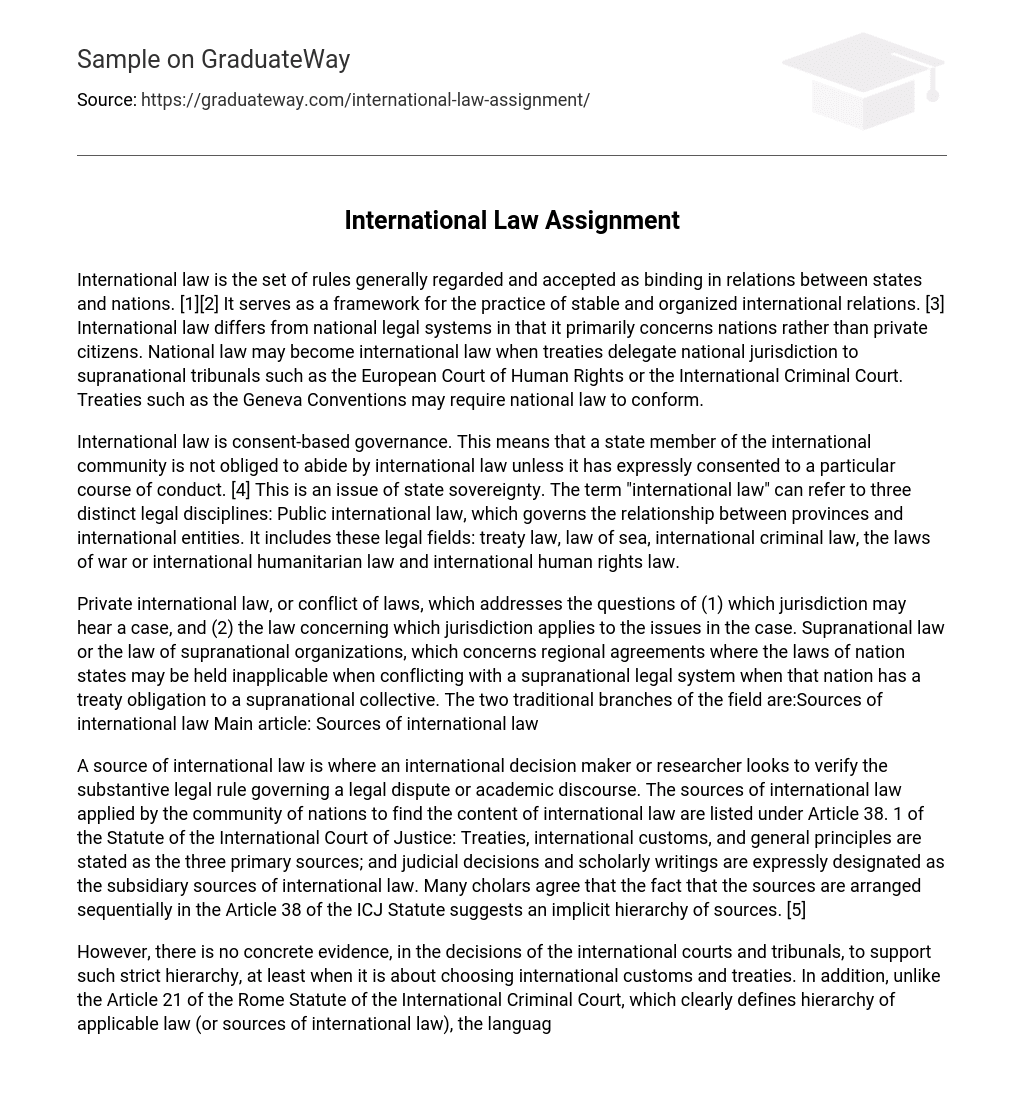International law is the set of rules generally regarded and accepted as binding in relations between states and nations. [1][2] It serves as a framework for the practice of stable and organized international relations. [3] International law differs from national legal systems in that it primarily concerns nations rather than private citizens. National law may become international law when treaties delegate national jurisdiction to supranational tribunals such as the European Court of Human Rights or the International Criminal Court. Treaties such as the Geneva Conventions may require national law to conform.
International law is consent-based governance. This means that a state member of the international community is not obliged to abide by international law unless it has expressly consented to a particular course of conduct. [4] This is an issue of state sovereignty. The term “international law” can refer to three distinct legal disciplines: Public international law, which governs the relationship between provinces and international entities. It includes these legal fields: treaty law, law of sea, international criminal law, the laws of war or international humanitarian law and international human rights law.
Private international law, or conflict of laws, which addresses the questions of (1) which jurisdiction may hear a case, and (2) the law concerning which jurisdiction applies to the issues in the case. Supranational law or the law of supranational organizations, which concerns regional agreements where the laws of nation states may be held inapplicable when conflicting with a supranational legal system when that nation has a treaty obligation to a supranational collective. The two traditional branches of the field are:Sources of international law Main article: Sources of international law
A source of international law is where an international decision maker or researcher looks to verify the substantive legal rule governing a legal dispute or academic discourse. The sources of international law applied by the community of nations to find the content of international law are listed under Article 38. 1 of the Statute of the International Court of Justice: Treaties, international customs, and general principles are stated as the three primary sources; and judicial decisions and scholarly writings are expressly designated as the subsidiary sources of international law. Many cholars agree that the fact that the sources are arranged sequentially in the Article 38 of the ICJ Statute suggests an implicit hierarchy of sources. [5]
However, there is no concrete evidence, in the decisions of the international courts and tribunals, to support such strict hierarchy, at least when it is about choosing international customs and treaties. In addition, unlike the Article 21 of the Rome Statute of the International Criminal Court, which clearly defines hierarchy of applicable law (or sources of international law), the language of the Article 38 do not explicitly support hierarchy of sources.
The sources have been influenced by a range of political and legal theories. During the 20th century, it was recognized by legal positivists that a sovereign state could limit its authority to act by consenting to an agreement according to the principle pacta sunt servanda. This consensual view of international law was reflected in the 1920 Statute of the Permanent Court of International Justice, which was succeeded by the United Nations Charter and is preserved in the United Nations Article 7 of the 1946 Statute of the International Court of Justice. edit]Public international law Main article: Public international law Public international law (or international public law) concerns the treaty relationships between the nations and persons which are considered the subjects of international law. Norms of international law have their source in either: custom, or customary international law (consistent provincial practice accompanied by opinio juris), globally accepted standards of behaviour (peremptory norms known as jus cogens or ius cogens), or codifications contained in conventional agreements, generally termed treaties.
Article 13 of the United Nations Charter obligates the UN General Assembly to initiate studies and make recommendations which encourage the progressive development of international law and its codification. Evidence of consensus or state practice can sometimes be derived from intergovernmental resolutions or academic and expert legal opinions (sometimes collectively termed soft law). International law has existed since the Middle Ages but much of its modern corpus began developing from the mid-19th century.
Two sophisticated legal systems developed in the Western World: the codified systems of continental European states (Civil Law) and the judge-made law of England (Common Law). The fall of the Roman civilization did not result in the loss of the concepts of Roman Law. Starting in the later Middle Ages, unlegislated Roman law (ius commune or lex mercatoria) was applied by merchants in northern Italian city states and north-western European countries as the basis for commercial (and other) relationships.
In the 20th century, the two World Wars and the formation of the League of Nations (and other international organizations such as the International Labor Organization) all contributed to accelerate this process and established much of the foundations of modern public international law. After the failure of the Treaty of Versailles and World War II, the League of Nations was replaced by the United Nations, founded under the UN Charter. The UN has also been the locus for the development of new advisory (non-binding) standards, such as the Universal Declaration of Human Rights.
Other international norms and laws have been established through international agreements, including the Geneva Conventions on the conduct of war or armed conflict, as well as by agreements implemented by other international organizations such as the International Labor Organization, the World Health Organization, the World Intellectual Property Organization, the International Telecommunication Union, UNESCO, the World Trade Organization, and the International Monetary Fund. The development and consolidation of such conventions and agreements has proven to be of great importance in the realm of international relations





